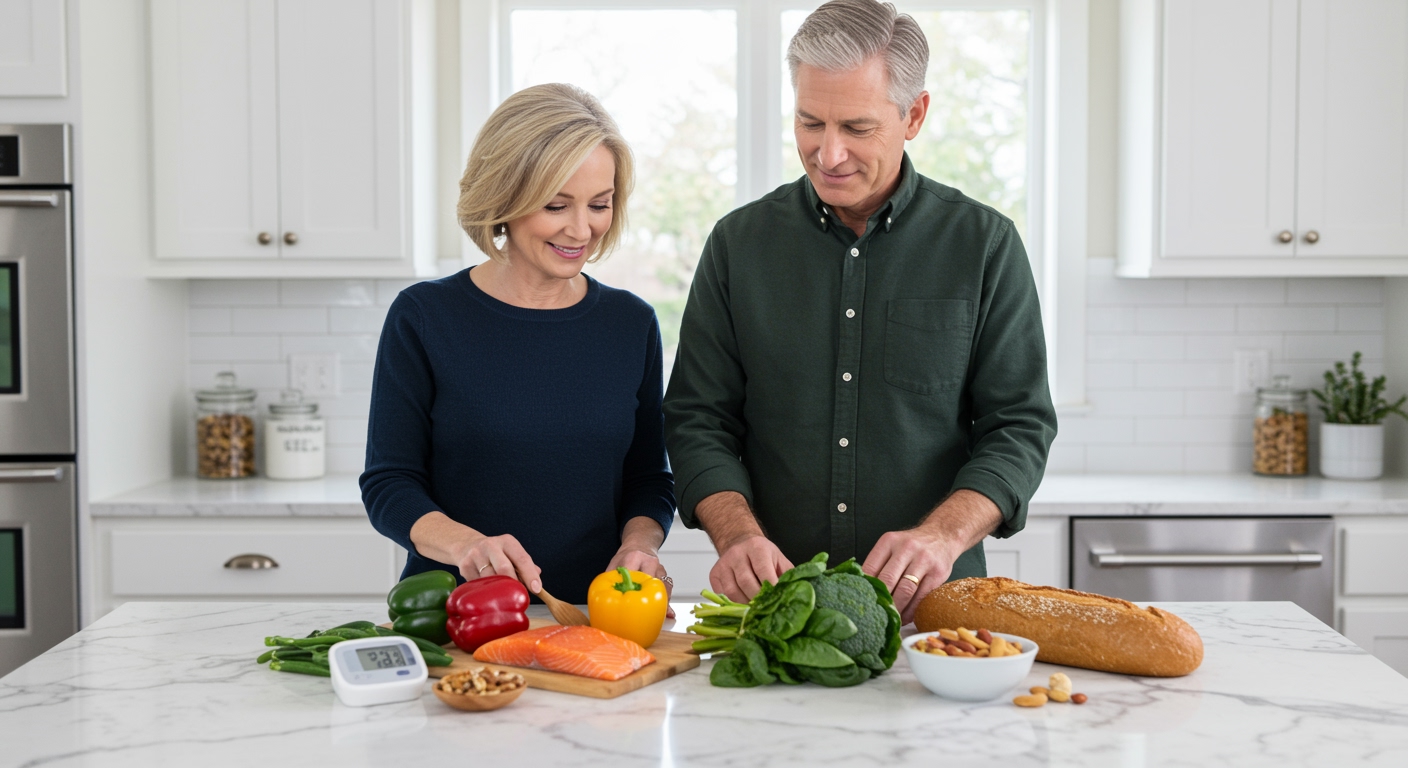✪ Key Takeaway: Eating together with family significantly lowers blood pressure through stress reduction and healthier food choices.
Introduction
Your blood pressure monitor shows those stubborn high numbers again, and you wonder if there is something simple you are missing in your daily routine.
You might be asking this question because you have heard conflicting advice about meal timing, social eating, and stress management for blood pressure control.
Hi, I am Abdur, your nutrition coach, and today I am going to explain how eating together with family can become your most powerful tool for managing high blood pressure naturally.
How Does Family Eating Lower Blood Pressure?
Family meals create a natural stress-reduction environment that directly impacts your cardiovascular system.
When you eat with loved ones, your body releases oxytocin, often called the bonding hormone.
This hormone triggers your parasympathetic nervous system, which is responsible for the rest and digest response.
Your heart rate slows down, blood vessels relax, and your blood pressure naturally decreases during these peaceful moments.
Research shows that people who eat family meals regularly have systolic blood pressure readings that are 8-12 points lower than those who eat alone most of the time.
The conversation and laughter during family meals also promote deeper breathing patterns, which further supports healthy blood pressure levels.
✪ Fact: Family meals can lower systolic blood pressure by up to 12 points through natural stress reduction.
What Food Choices Happen During Family Meals?
Family dining naturally encourages healthier food selections compared to solo eating habits.
When you eat with others, you tend to choose more balanced meals with vegetables, lean proteins, and whole grains.
Solo eaters often grab processed foods, salty snacks, or fast food options that spike blood pressure through excess sodium intake.
Family meals also promote slower eating, which gives your brain time to register fullness signals.
This prevents overeating, which can lead to weight gain and increased blood pressure over time.
The social aspect of family dining creates accountability for making better food choices because others witness what you eat.
Studies indicate that people consume 200-300 fewer calories per meal when eating with family compared to eating alone while watching television or using electronic devices.
✪ Pro Tip: Put away all electronic devices during family meals to maximize the blood pressure benefits.
Why Does Meal Timing Matter For Blood Pressure?
Regular family meal schedules create circadian rhythm stability that supports healthy blood pressure patterns.
Your blood pressure naturally fluctuates throughout the day, with the lowest readings typically occurring during evening hours.
Family dinners usually happen during this optimal time window, allowing your body to benefit from the natural blood pressure dip.
Consistent meal timing also helps regulate cortisol levels, the stress hormone that can elevate blood pressure when chronically elevated.
When you eat at random times or skip meals, your body experiences stress responses that cause blood pressure spikes.
Family meal routines eliminate this chaos by providing predictable eating patterns that your cardiovascular system can anticipate and prepare for.
✪ Note: Eating dinner between 6-8 PM with family maximizes natural blood pressure reduction benefits.
Can Social Support Reduce Blood Pressure Medication Needs?
Strong family connections through shared meals can reduce dependence on blood pressure medications over time.
The emotional support system created during family dining helps manage chronic stress, which is a major contributor to hypertension.
When family members share daily experiences and concerns during meals, it provides natural stress relief that pharmaceutical interventions cannot replicate.
This social support network also creates accountability for taking medications as prescribed and following dietary recommendations.
Family members can remind each other about medication schedules and encourage healthy lifestyle choices that complement medical treatment.
However, you should never stop taking prescribed blood pressure medications without consulting your healthcare provider first.
The goal is to use family meals as a complementary strategy that may allow for medication adjustments under medical supervision.
✪ Pro Tip: Track your blood pressure readings before and after implementing regular family meals to show your doctor.
What If You Live Alone Or Have Scheduling Conflicts?
Living alone does not eliminate your ability to create social eating experiences that benefit blood pressure control.
You can schedule regular meals with friends, neighbors, or extended family members to gain similar cardiovascular benefits.
Video calls during meals can also provide some social connection, though the benefits are not as strong as in-person dining.
If scheduling conflicts prevent regular family meals, try to eat together at least three times per week to see meaningful blood pressure improvements.
Weekend family brunches or Sunday dinners can provide concentrated social eating benefits that carry over into the week.
The key is consistency rather than frequency, so choose a schedule that works for your family and stick to it.
Even brief 20-minute shared meals can trigger the stress-reduction responses that lower blood pressure naturally.
✪ Fact: Just three family meals per week can provide 70% of the blood pressure benefits of daily shared dining.
The Bottom Line
Eating together with family is one of the most effective natural strategies for managing high blood pressure through stress reduction and improved food choices.
The dinner table is where hearts heal and blood pressure falls, making family meals your most powerful medicine cabinet.
I would love to hear about your family meal experiences and how they have impacted your blood pressure journey, so please share your thoughts and questions in the comments below.
References
At NutritionCrown, we use quality and credible sources to ensure our content is accurate and trustworthy. Below are the sources referenced in creating this article:
- American Heart Association: 2017 ACC/AHA/AAPA/ABC/ACPM/AGS/APhA/ASH/ASPC/NMA/PCNA Guideline for the Prevention, Detection, Evaluation, and Management of High Blood Pressure in Adults
- Medical News Today: Foods to avoid with high blood pressure
- British Heart Foundation: Foods that lower blood pressure
- PMC: The Role of Family Meals in Health and Disease





